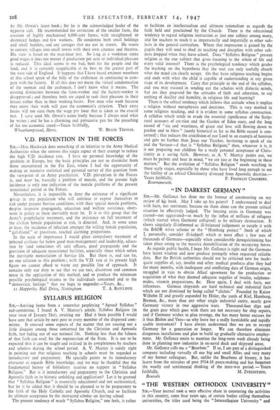SYLLABUS RELIGION
Sts,—Arriving home from a somewhat perplexing "Agreed Syllabus" sub-committee, I found A. V. Murray's article, Syllabus Religion (in your issue of January 31st), awaiting me Had it been possible I would have sent that article by next post to every member of the dispersed com- mittee. It stressed some aspects of the matter that are causing not a little disquiet among those concerned for the Christian and Apostolic faith, fast fading out of our national life. Nothing less than the fulness of that faith can avail for the regeneration of the State. It is not to be expected that it can be taught and realised in its completeness by teachers and scholars during the school period. A. V. Murray is surely right in pointing out that religious teaching in schools must be regarded as introductory and preparatory. He specially points to its introductory character as regards Bible knowledge, and we may be thankful that the fundamental heresy of bibliolatry receives no support in" Syllabus Religion." But is it introductory and preparatory to the Christian and Apostolic faith in its historic unfolding and application? Let it be granted that " Syllabus Religion" is essentially educational and not ecclesiastical, but let it be added that it should be so planned as to be preparatory to the faith of the Holy Catholic and Apostolic Church, and so facilitate its ultimate acceptance by the instructed scholar on leaving school.
The present tendency of much "Syllabus Religion," one feels, is rather to facilitate an intellectualism and ultimate rationalism as regards the faith held and proclaimed by the Church. There is the educational tendency to regard religions instruction as just one subject among many, and for teachers to teach it as impersonally and impartially as other sub- jects in the general curriculum. Where that impression is gained by the pupils they will tend to shed its teaching and discipline with other sub- jects dropped when they leave school. Does "Syllabus Religion" present religion as the one subject that gives meaning to the whole of life and every valid interest? There is the psychological tendency which grades the teaching on the hypothesis that the soul can only usefully absorb what the mind can clearly accept. On that basis religious teaching begins and ends with what the child is capable of understanding at any given stage of its development. Carry that principle to the end of the syllabus, and you may succeed in sending out the scholars with dialectic minds, but are they prepared for the attitudes of faith and adoration, to say nothing of docility and humility, in religious life and learning?
There is the ethical tendency which follows that attitude when it implies a religion without metaphysics and doctrines. This is very marked in some religious teaching, and it is evident in some syllabus construction. A syllabus which tends to evade the essential significance of the Scrip- tural accounts of creation and the Garden of Eden story, and the long record of "sin and weariness, of grace and love still flowing down to pardon and to bless" (surely historical as far as the Bible record is con- cerned) ; that reduces the crucifixion of our Lord to an example of heroism and gets no further than Jesus our Teacher, hesitating to speak of sin and the Saviour—if that is "Syllabus Religion," then, whatever it is, it is not preparing our children for a ready personal acceptance of Chris- tianity as a saving faith. However, as A. V. Murray points out, we must be patient and bear in mind, "we are just at the beginning in these matters." But the evolution of "Syllabus Religion" needs watching in these early stages, especially by those who have lived long enough to see the futility of an ethical Christianity divorced from Apostolic doctrine.—


































 Previous page
Previous page